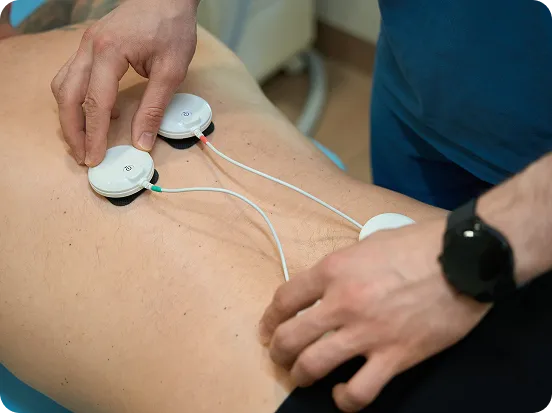Spinal Cord Stimulation
Minimally invasive pain relief using advanced nerve stimulation.

What Is Spinal Cord Stimulation?
Spinal cord stimulation (SCS) is a minimally invasive neuromodulation technique used to manage chronic pain by interrupting pain signals before they reach the brain.
A small device is implanted near the spine and delivers mild electrical impulses through leads placed close to the spinal cord. These impulses alter how the brain perceives pain—without changing the anatomy of your spine or requiring long-term medication use.
What Is Spinal Cord Stimulation?
Spinal cord stimulation (SCS) is a minimally invasive neuromodulation technique used to manage chronic pain by interrupting pain signals before they reach the brain.
A small device is implanted near the spine and delivers mild electrical impulses through leads placed close to the spinal cord. These impulses alter how the brain perceives pain—without changing the anatomy of your spine or requiring long-term medication use.

How Spinal Cord Stimulation Works
Spinal cord stimulation works by delivering mild electrical pulses to the spinal cord through thin wires (leads) placed near the nerves that carry pain signals. These leads are connected to a small generator implanted under the skin—typically in the abdomen or buttock area.
Before receiving a permanent device, all patients go through a trial period. Temporary leads are placed and connected to an external stimulator worn around the waist for 5 to 10 days. If the trial provides significant pain relief, a permanent implant is recommended. If not, the leads are easily removed without lasting changes.
This personalized approach allows both patient and provider to confirm that spinal cord stimulation is the right treatment.
Key Benefits of SCS
Spinal cord stimulation offers a range of advantages over traditional pain treatments. From faster recovery to long-term relief without medication, this therapy is designed to improve daily function and overall quality of life.
Reversible and Adjustable
Turn the device off anytime or adjust intensity and location of stimulation.
Drug-Free Pain Management
Helps reduce or eliminate the need for opioid medications.
Minimally Invasive
Small incisions and fast recovery time compared to surgery.
Improved Quality of Life
Better sleep, enhanced mobility, and more comfort in daily routines.
Conditions Treated with SCS
Spinal cord stimulation is commonly used to treat:
Failed Back Surgery Syndrome (FBSS)
Ongoing pain after spinal surgery, often caused by nerve damage, scar tissue, or unresolved issues.
Complex Regional Pain Syndrome (CRPS)
Chronic, intense pain following injury or surgery, often with swelling, skin changes, and limited mobility.
Peripheral Neuropathy
Nerve damage outside the brain and spinal cord causing pain, numbness, or weakness—typically in hands or feet.
What to Expect During the Procedure
01 Before the Procedure
✔ Your provider will review your medical history, medications, allergies, and symptoms to ensure you’re a good fit.
02 During the Procedure
✔ Local anesthesia is applied.
✔ Imaging guidance (X-ray) is used to place the leads accurately.
✔ Generator is implanted under the skin.
✔ Incision is closed and recovery begins the same day.
✔ This is an outpatient procedure that usually lasts under an hour.
03 Recovery and Follow-Up
✔ Go home the same day
✔ Follow care instructions for the incision
✔ Avoid strenuous activity
✔ Attend follow-up visits for device adjustment and monitoring
✔ Device can be fine-tuned for better performance
Am I a Good Candidate?
You may be a good candidate for spinal cord stimulation if:
Chronic Pain Lasting Over 3 Months
Ongoing pain that hasn’t improved with time or conservative treatment methods.
Limited Relief from Other Treatments
Physical therapy, medications, or injections have not provided significant or lasting improvement.
Preference to Avoid Surgery
You’re looking for a less invasive alternative to spinal surgery.
No Conditions That Interfere
You don’t have active infections, bleeding disorders, or uncontrolled mental health issues that could affect the procedure.
Your provider will determine if spinal cord stimulation is right for you based on your medical history, symptoms, and overall health.
Additional Neuromodulation Options
At Spinal Diagnostics we offer a range of advanced treatments in addition to SCS:
✔ ReActiv8 Neurostimulation: Stimulates the multifidus muscle to restore spinal stability and treat mechanical low back pain.
✔ Sacral Nerve Stimulation (SNS) Treats urinary or bowel dysfunction by targeting the sacral nerves in the lower back.
✔ Peripheral Nerve Stimulation (PNS): Treats localized chronic pain by stimulating peripheral nerves near the site of pain (arm, leg, etc.).

Care That’s Close to Home
We offer care from two convenient clinic locations, making it easy to access expert medical support close to home.
Each facility is designed to provide a welcoming, safe, and efficient environment equipped with advanced technology and supported by a compassionate team dedicated to your well being.
Tualatin Clinic
Newberg Clinic
Care That’s Close to Home
We offer care from two convenient clinic locations, making it easy to access expert medical support close to home.
Each facility is designed to provide a welcoming, safe, and efficient environment equipped with advanced technology and supported by a compassionate team dedicated to your well being.
Tualatin Clinic
Newberg Clinic

Why Choose Spinal Diagnostics?
Patients choose Spinal Diagnostics for our comprehensive approach, accurate diagnostics, and compassionate care. We stay at the forefront of interventional procedures and are committed to improving your quality of life—without opioids or invasive surgeries.
Proven Medical Expertise
We bring years of clinical experience in pain management and interventional procedures.
Constant Innovation
We use the latest techniques and technology to ensure safe, effective treatment.
Compassionate Care
We listen, understand, and treat every patient with empathy and respect.
Personalized Plans
Each treatment is tailored to your condition, goals, and lifestyle.
Discover what's behind your pain.
Explore the conditions we treat and find the answers you’ve been looking for.
Discover what's behind your pain.
Explore the conditions we treat and find the answers you’ve been looking for.

